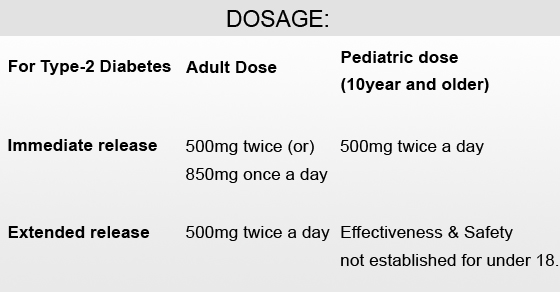If you have diabetes, You will take some type of medicine to control it. If you have Type 1 diabetes, you must take insulin. But if you have Type 2 diabetes, there are many options, ranging from no medicine to diabetes pills to non-insulin injectables to insulin.
There are another way also to manage your diabetes with healthy eating, weight control, and physical activity. But at some point, you may need to take medication, including insulin. Unless your blood sugar and A1C levels are quite high, you would likely start on a type of diabetes pill. Today, there are so many diabetes pills. Out of those Metformin is best and most commonly prescribed diabetes pills.
What is Metformin?
Metformin, an oral medication used to treat type-2 diabetes, also in overweight, poly-cystic ovaries and in few instances like cardiovascular diseases & cancer complications of diabetes.

Type-2 diabetes usually diagnosed at adulthood seen in 90-95 cases in every 100 diabetic patients. In this condition where the person cannot use the insulin effectively, thereby body isn’t able to use insulin the right way. So termed as ‘’Insulin resistance’’. Unlike type-1 where body’s immune system destroys the cells that produce Insulin, thereby complete lack of Insulin and cannot be prevented easily and rarely seen in 5-10 in every 100.
It acts by suppressing glucose production by the liver (gluconeogenesis) also increases insulin sensitivity, hence used along with insulin or any other diabetic medication. It has an oral bioavailability of 50-60% in fasting condition and is absorbed slowly, where it takes 1-3 hours for immediate-release & 4-8hours with extended-release formulations.
Dosage:
Metformin is available as a generic drug, but brand names include Glucophage, Glucophage XR, Glumetza, Riomet, and Fortamet
Metformin comes in tablet and liquid form. It also is available as an extended-release (long-acting) tablet. The regular tablet and the liquid are generally taken with meals one to three times each day. The extended-release form is typically taken once a day with the evening meal. Your doctor will likely start you off on a lower dose of metformin — say, 500–1,000 milligrams (mg) per day — and then gradually increase the dose. The maximum dose of metformin is usually not more than 2,000 mg per day.

Contraindications:
- Anyone with lactic acidosis & kidney disorders. Lung and liver diseases with heart failure, increased risk of lactic acidosis with metformin are usually noticed.
- In gastrointestinal intolerance to metformin
- Exercise caution of metformin uses before a surgery & diagnosis like CT scan.
Uses:
- Metformin lowers the rate of adverse cardiovascular disorder in overweight patients with type-2 diabetes. It has little or no effect on body weight, although it can cause weight loss in comparison to sulfonylurea.
- It has encouraging effects on cases with polycystic ovary syndrome and insulin sensitivity. Metformin administration during pregnancy is slightly controversial, as it reduces the number of complications.
- Found effective & safe as insulin, during pregnancy (gestational diabetes)

Side effects:
Metformin is a very safe and effective medicine. Because of that reason only many diabetes management doctor’s recommend starting people with Type 2 diabetes on this medicine, even when a person is first diagnosed with diabetes. But, as with all medicines, it’s not free of side effects
- Common side effects include
- Gastrointestinal irritation
- Diarrhea
- Cramps
- Nausea
- Vomiting & increased flatulence.
- Stomach upset is most common when metformin is administered first (or) when the dose is increased.
- Higher dosage and prolonged use of metformin can lead to increased homocysteine levels & malabsorption of vitamin B12, So incidence of vitamin B12 deficiency is seen.
- As metformin is a biguanide, it causes lactic acidosis (metformin- related lactic acidosis), often it can be fatal in few cases.
Metformin may decrease the absorption of vitamin B12, and this can put you at risk for B12 deficiency. If you’ve been taking metformin for several years and/or if you have numbness, pain, or tingling in your hands or feet, ask your doctor to check your blood vitamin B12 level. You may need to take a B12 supplement
